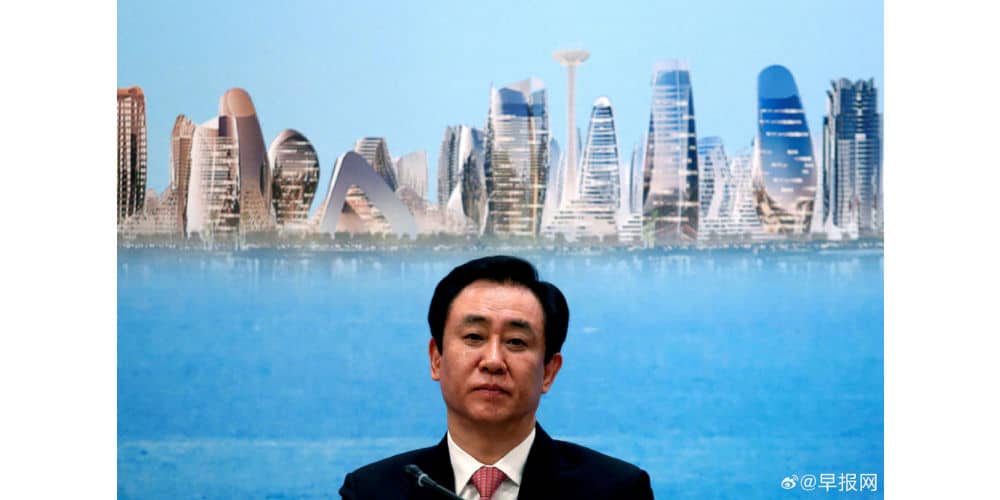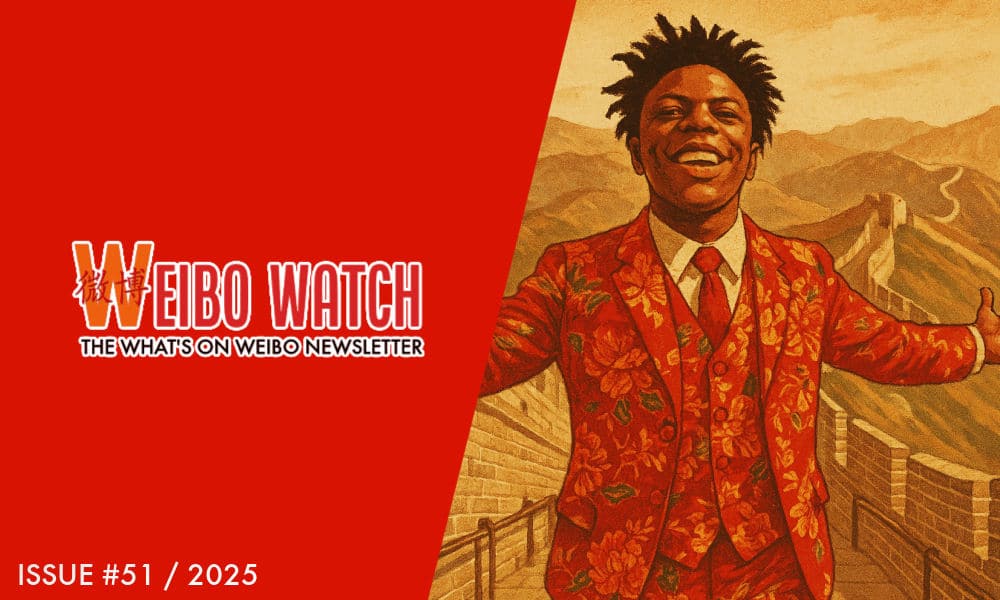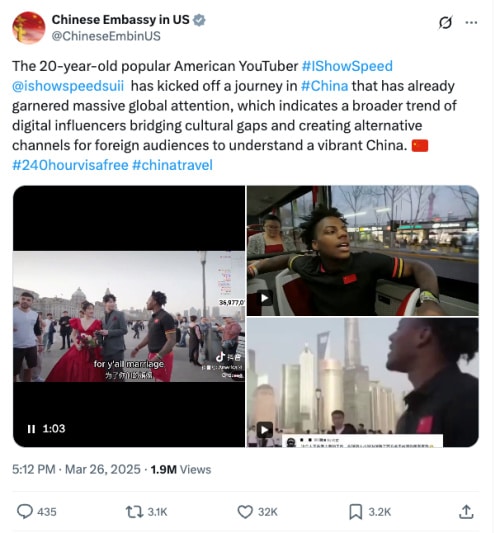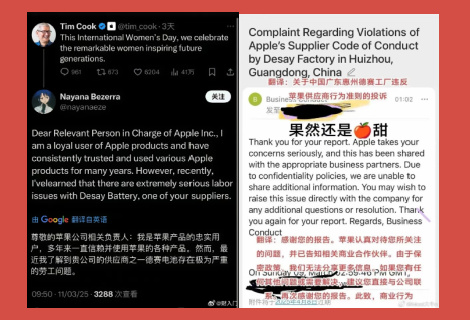Newsletter
Weibo Watch: The Digital Torchbearer
What’s trending on Weibo? About the main media message of the Asian Games, the most controversial embrace, how the Huawei product launch generated a new popular word, and much more.
Published
2 years agoon

PREMIUM NEWSLETTER | ISSUE #15
This week’s newsletter:
◼︎ 1. Editor’s Note – The digital torchbearer
◼︎ 2. What’s Trending – A closer look at the featured stories
◼︎ 3. What More to Know – Highlighting 8 hot topics
◼︎ 4. What Lies Behind – Nanyang’s Midi disaster
◼︎ 5. What’s Noteworthy – An inappropriate video
◼︎ 6. What’s Popular – Shaq’s China tour
◼︎ 7. What’s Memorable – Special travel forces
◼︎ 8. Weibo Word of the Week – “Far Ahead”
Dear Reader,
Following deadly attacks by Hamas, Israel launched a mega counter offensive after Prime Minister Netanyahu declared that the country is at war. The Israel-Palestine crisis, much like elsewhere globally, is a major topic of discussion on Chinese social media.
The Chinese Foreign Ministry responded to the conflict on Saturday, expressing concerns about the escalating tensions and voicing China’s stance that civilians should be protected and that further deterioration should be prevented.
They also reiterated that the fundamental solution to the Israeli-Palestinian conflict and the path to peace, according to China, lies in the implementation of the “two-state solution” (两国方案) and the establishment of an independent Palestinian state.
While distressing images of innocent civilians, including children, suffering in the violence are circulating all over social media, there is an entirely different event that is attracting attention online as the Asian Games are coming to an end.
The 19th Asian Games closing ceremony on October 8th features a spectacular golden “digital torchbearer,” which was also featured in the opening ceremony, brought to life through augmented reality (AR) technology.

The giant ‘torchbearer’, who is named Nongchao’er (弄潮儿#), represent many things. Amongst others, Nongchao’er symbolizes technological innovation, not just in Hangzhou, Zhejiang, and the Asian Games, but also in China as a whole.
Chinese state media recently reported about all the digital highlights at the Hangzhou Asian Games, featuring innovative technological applications. Besides a ‘digital torchbearer,’ this also includes the launch of the first-ever metaverse platform for a major multi-sport event, electronic identity registration cards, and the exploration of 5.5G technology (#杭州亚运会上的数字智能亮点#).
Perhaps more important than all these initiatives themselves is the way they are propagated to a wider audience. Whether it is the Asian Games or the latest Huawei product launch, the narrative is all about China staying ahead, China as the pioneer, China as the innovative digital leader in a new world order.
Adding to this narrative is China’s achievement of its 200th gold medal at the Asian Games, and so the official media accounts focus on underscoring China’s success in both digital and sports arenas, making sure that everyone knows that ‘Team China’ is on the winning track.
Miranda Barnes has made contributions to this week’s newsletter. As always, please don’t hesitate to reach out to me about the latest China trends you spotted and would like to know more about. Contact me via email or DM, or follow me on X for the latest news and trends (oh and I’m also active on Instagram here and here).
Best,
Manya
PS In case you missed it, some of the things I tweeted about:
➡️ X, formerly Twitter, prides itself in its community notes system. But especially when it comes to China-related news, these contributor notes can be deceiving. Tweet.
➡️ Spotted on Weibo: when you just ordered a Didi but also get the Chinese garden and teahouse experience for free. Tweet.
➡️ An unexpected viral sensation in light of the China visit by Syrian President Bashar al-Assad and wife; the Chinese special agent and female bodyguard who accompanied them during their various activities in China. Tweet.
What’s Trending

1: Thefts at Midi Music Festival | The many thefts and tent lootings at China’s Midi Music Festival that occurred during the National Day holiday in Nanyang have become a major topic on Chinese social media this week. What went wrong and who is to blame for so many festival-goers getting their personal belongings stolen from them?

2: Camel Jams | During this National Day public holiday, scenic spots all over China were super crowded with tourists. One spot that was especially popular this year is Dunhuang in Gansu. Six kilometers south of the city you find the “Singing Sand Mountains & Crescent Moon Spring” (鸣沙山月牙泉). The huge crowds visiting the area have attracted attention on Chinese social media, where people joke about the ‘camel jams’ (堵骆驼) happening due to so many tourists doing camel rides in the scenic area, causing enormous lines of camels throughout the desert.

3: Ongoing Discussions on ‘Cābiān’ | Chinese social media is seeing more discussions recenty on the blurred boundaries of cābiān. This seemingly never-ending discussion raises questions – not just about sexually suggestive content, but also about the evolving perceptions of women’s bodies and freedom in the digital age.

4: ‘Official’ Moment Caught on Camera | Two officials working at a local subdistrict office in Shandong are now suspended after a leaked video showed them engaging in sexual acts shortly after an online meeting. The secretary had allegedly forgot to turn the camera off after a team meeting.
What More to Know

◼︎ 🔎 1. Evergrande Founder Facing Legal Troubles. China’s second-largest development firm Evergrande, all over the news due to its debt woes, has recently become a big topic of discussion once again as news came out that its billionaire chairman and founder, Hui Ka Yan (Xu Jiayin 许家印), is being investigated by the authorities for suspected criminal behavior and is currently under so-called residential surveillance. The criminal charges he potentially faces are yet unspecified. Shortly after the news came out, trading of the company’s shares was halted for two days. (Weibo hashtag: #许家印已被依法采取强制措施# Xu Jiayin Facing Legal Enforcement Measures, 830 million views).
◼︎ 📲 2. Huawei’s Champion Chip. Huawei just keeps making waves on Chinese social media these weeks. China’s tech giant held its fall product launch on September 25, showcasing new tablets, watches, TVs, and high-end smartphones. The event featured Hong Kong star Andy Lau endorsing the products with an emotional musical performance. The launch was very much anticipated because people had hoped to learn more about the Mate60 smartphone’s powerful Kirin 9000 chip, which was developed after the U.S. sanctions. However, there was no extra focus on the background of the chip, which is believed to be self-produced. (Hashtag “Huawei News Conference” ##华为发布会##, received 595 million views on September 25).
◼︎ 🇹🇭 3. Chinese among Bangkok Shooting Victims. The deadly Thai shopping mall shooting, which occurred in Bangkok on October 3rd, left at least two people dead and five others injured. Among the victims are two Chinese citizens, of which one is among the deceased. The news made quite an impact on Chinese social media, as Thailand just introduced its temporary visa-free travel policy for Chinese nationals in an effort to boost the tourism industry after the pandemic. Both victims from China had arrived in Thailand under the new policy. The Chinese female tourist who lost her life is leaving behind two young twin daughters, who were also present at the scene and witnessed their mother being shot. “Don’t go to Thailand, it’s not safe,” a typical comment on Weibo said. The shooter, only 14 years old, has been arrested and faces multiple charges. (Hashtags: “Three People Dead after Thai Mall Shooting” #泰国一商场发生枪击案已致3人死亡#, 220 million views; “Thai Prime Minister Apologizes to Chinese Ambassador” #泰国总理致电中国大使道歉#, 160 million views; “Chinese Victims in Thai Shooting entered Country Under Visa-Free Policy #泰国枪击案死伤中国游客系免签入境#, 130 million views).
◼︎ 🏫 4. “Extreme Bullying” Case at Shanxi School. A severe case of intimidation and (sexual) assault at a bilingual primary school in Shanxi has sparked discussions on campus bullying in China in recent weeks. This case is particularly significant because it involves young children; two 4th graders, aged 9, targeted another 10-year-old boy. Not only did the boys subject their classmate to verbal abuse and beatings, they also coerced him into engaging in inappropriate actions with them. The incident garnered nationwide attention after the boy’s parents shared an online message detailing their child’s physical assault and expressing dissatisfaction with the school’s inadequate response, despite enduring this ordeal for a year. Campus bullying has been a longstanding issue in Chinese schools, but cases involving such young perpetrators rarely make headlines. By now, the school principal has been removed from their position. The two minors have been reprimanded. (Weibo hashtag “Police Responds to Online Datong Primary School Bullying Incident” #警方回应网传大同小学生霸凌事件#, 390 million views).
◼︎ 🤢 5. Flowing Noodles Food Poisoning Outbreak. Perhaps you’ve recently noticed a trend surrounding so-called “flowing noodles.” On TikTok and beyond, there have been many videos hyping this style of eating, in which Japanese restaurants offer guests a summer activity where noodles flow down a bamboo chute filled with cool water. In Japan’s Ishikawa, such flowing noodles recently led to a major food poisening outbreak, linked to Campylobacter bacteria, affecting 892 people across 18 prefectures. The restaurant in question was closed after the outbreak. (Weibo hashtag “Japanese Flowing Noodles Causes food Poisening among 892 Individuals” #日本流水面致892人中毒#, 330 million views.)
◼︎ 🚨 6. Shanghai Girl Goes Missing in Sea. A 4-year-old girl from Shanghai went missing in sea in Pudong, as reported by local police on October 6th. The girl had gone to the beach with her family on October 4. As the girl was playing by the seaside, her father briefly left to grab his phone. When he returned, he could not find his daughter and the parents reported her missing shortly after. Despite deploying a substantial search team and employing infrared drones, the girl has yet to be found. Although surveillance videos of the area were blurry, one moment did show the girl walking towards the sea in her father’s absence and disappearing into the sea. Despite the odds, thousands of Weibo users have expressed their hopes for the safe return of the girl. (Hashtag: “Shanghai Police Reports 4-Year-Old Girl Missing at Sea” #上海警方通报4岁女童在海边走失#, 150 million views).
◼︎ 🥮 7. Mid-Autumn Festival & National Day Holidays. As China’s Mid-Autumn Festival and National Day public holiday comes to an end, Chinese media report a boom in domestic tourism numbers, as more people went out to travel this week compared to the same period in pre-Covid 2019. The number of domestic tourists reportedly reached 826 million – a 4.1% increase compared to 2019. During this year’s holiday, music festivals, concerts, and museums were especially popular. (Weibo hashtag: “Mid-Autumn Festival and National Holiday Sees 826 Million Trips #中秋国庆假期国内8.26亿人次出游#, 35 million views).
◼︎ 💻 8. Cyberbullies in Court. In 2022, the Liu Xuezhou case gripped the attention of millions of Chinese netizens. Liu Xuezhou (刘学州) became famous overnight when he used social media to seek help in locating his biological parents. But his quest to find his parents ended in disappointment, and he became the target of relentless online harassment. Overwhelmed by the pressure, Liu took his own life at the age of 15. Now, Liu Xuezhou’s name has resurfaced as a trending topic on social media, but this time it’s due to the commencement of a trial against those responsible for cyberbullying him. The legal action has been initiated by Liu’s family, who are seeking to hold the perpetrators of his online harassment accountable and seek justice on his behalf. The trial, conducted offline, involves two prominent online influencers who had targeted Liu Xuezhou. As of now, a verdict has not been reached (Hashtag “No Verdict Yet in Liu Xuezhou Cyberbully Case” #刘学州被网暴案未当庭宣判#, 9,9 million views).
What Lies Behind

Stark Disparities at the Midi Music Festival Theft Controversy
The recent theft incident at Nanyang’s Midi Festival (南阳迷笛音乐节现偷盗事件) has become a major topic of discussion in China this week, and it seems to have been blown out of proportion while new discussions, memes and jokes on the topic keep flooding the internet.
Why did these thefts, which occurred while festivalgoers were enjoying the music, generate so much attention? One key factor is the stark contrast between the two groups involved: the victims were young, tech-savvy urban music fans, while the thieves were older, less digitally savvy locals from rural areas.
The Chinese music enthusiasts who attended Midi Festival are passionate about rock music, live entertainment, immersive experiences, and leisure travel. This consumer group generated a whopping 2.5 billion yuan (US$350 million) in music festival and concert ticket sales in the first half of this year alone. Most of them are young, educated, and socially connected, and they didn’t think twice about bringing their latest digital gadgets, laptops, cameras, and camping gear to enjoy their time in Nanyang. Perhaps it did not even cross their mind that something might happen?
On the flip side, the local villagers involved belong to an entirely different social class. Many of them have lower levels of education and income. They saw an opportunity amidst the festival chaos. Rumors on the internet suggested that the festival was over, and the site needed to be cleared, so they believed that anything left behind was fair game, including valuable items. Some may have genuinely believed this, while others went along with the narrative, assuming they could escape consequences. Some even brought mini pickup trucks to the campsite to take more items home. They seemed oblivious to the efforts and plans local authorities had put into promoting and organizing the festival, which would boost the regional economy in the long run.
These villagers likely live have limited exposure to social media and the digital world around them. Had they been more aware, there is no way they could have thought they could get away with stealing other people’s in broad daylight. They would have realized just how unacceptable it is. Perhaps it did not even cross their mind either that something might happen.
Now, many online discussions focus on alleged slander campaigns against the festival, Nanyang, or even Henan. However, the real issue lies in the stark divide between the rural villagers, who seem unaware of the festival’s broader context, and the urban festivalgoers, who can’t comprehend why these villagers resorted to theft. It’s as if they come from different worlds. This clash serves as a reminder that some individuals have been left behind during China’s rapid economic growth and digitalization. While China’s thriving live music industry brings people together, this particular incident also highlights the stark disparities that persist.
What’s Noteworthy

The most talked-about embrace of the Asian Games | Chinese track & field athletes Lin Yuwei (林雨薇) and Wu Yanni (吴艳妮) shared an emotional embrace following the women’s 100-meter hurdles final at the Asian Games in Hangzhou on October 1st. Chinese athlete Lin Yuwei crossed the finish line first with a time of 12.74 seconds, achieving a personal best, and Wu initially finished second.
A photo of the hug, shot by Vincent Thian for the Associated Press, made international headlines this week. As Lin’s and Wu’s lanes were 6 and 4, the signs of the two women aligned as they hugged, forming the numbers “6-4,” widely seen as a reference to the Tiananmen student protest crackdown of June 4, 1989. As reported by CNN, Chinese state media outlet CCTV originally posted the photograph on Weibo on Sunday night, but removed it from its account about an hour later.
By now, virtually all versions of this image that clearly shows the ‘6’ and ‘4’ lined up have been removed from Weibo and beyond. The reference to the date, especially on China’s National Day, was undoubtedly deemed too sensitive. This incident was soon covered by BBC, The Guardian, and many other Western media outlets, as sign of Chinese political censorship.
In China, however, it was not the photo nor its censorship that created a buzz on social media, but the fact that Wu Yanni was later disqualified from the 100m hurdles final after a false start. Wu posted an apology on Monday, expressing her respect for the referee’s final decision. She also received some criticism for dragging the Chinese flag on the ground, while her fellow athlete Lin Yuwei held the flag up at all times. The hashtag “Wu Yanni disqualified” (#吴艳妮成绩被取消#) racked up 430 million views on Weibo.
What’s Popular

Shaq here, Shaq there, Shaq everywhere | It’s been a busy China week for Shaquille O’Neal. The American former professional basketball player has been touring Shanghai, Hangzhou, and Macao. Photos on social media showed how ‘Shaq’ seemed to be everywhere at once while having a seemingly great time, and grabbing all the promo-activities he could. His China tour was, among others, sponsored by Gillette, and fans could get tickets for a meet & greet with their “giant” hero. Shaq has been to China many times before but this was his first post-pandemic tour, and it was probably a good opportunity for him and his team to make some 💰💰💰. He did various Asian Games-related activities, did some Papa John’s promotions, got acquainted with a local group of square-dancing grannies, participated in a promotion on Taobao for the Mid-Autumn Festival, went out on a scooter ride in Hangzhou, and had loads of mooncakes and called himself “half Chinese”, which then went trending on Weibo (he was also making mooncakes, but the gloves did not fit him.).
What’s Memorable

Fun, Fast, Frugal Travel | In this post ‘Covid zero’ year, ‘special forces travelers’ are flooding popular tourist spots across China. Their mission is clear: covering as many places as possible at the lowest cost and within a limited time. While the travel trend has become a social media hype, there are also those criticizing the trend for being superficial and troublesome. This article, from our archives just five months ago, is all the more relevant during this National Holiday.
Weibo Word of the Week

“Far Ahead” | Our Weibo Word of the Week is “遥遥领先” (yáo yáo lǐng xiān) which translates to “be far ahead.”
During the much-anticipated Huawei launch event on September 25, consumer chief Richard Yu unveiled an impressive array of Huawei’s latest products and innovations, such as the latest version of its MatePad Pro (the world’s lightest and thinnest tablet of its kind), a new smart TV, wireless earphones, and he also announced Huawei’s first sedan, the Luxeed S7, which allegedly will be “superior” to Tesla’s Model S “in every specification.”
During his speech, Yu recurringly used the phrase “far ahead”, “遥遥领先” (yáo yáo lǐng xiān), to indicate that Huawei is fully future-proof and far ahead of other companies. As a result, the phrase became popular among Chinese netizens, who started using it for all kinds of things.
It did not take long for the phrase to get registered as a trademark by some business owners in Shenzhen who hope it might bring them some profit (#遥遥领先已被注册商标#). One thing is sure: they were the first and ‘far ahead’ of others.
This is an on-site version of the Weibo Watch newsletter by What’s on Weibo. Missed last week’s newsletter? Find it here. If you are already subscribed to What’s on Weibo but are not yet receiving this newsletter in your inbox, please contact us directly to let us know.
Stories that are authored by the What's on Weibo Team are the stories that multiple authors contributed to. Please check the names at the end of the articles to see who the authors are.

China Media
IShowSpeed in China: Streaming China’s Stories Well
Published
6 months agoon
March 30, 2025
“This man is doing God’s work. In just six hours, he eliminated all Western media propaganda about China,” Chinese influencer Li Sanjin (李三金) said in one of his videos this week. The man he referred to, allegedly doing ‘God’s work,’ is the American YouTuber and online streamer Darren Watkins, better known as IShowSpeed or Speed, who visited China this week and livestreamed from various locations.
With 37 million followers on his YouTube account, Watkins’ visit hasn’t exactly flown under the radar. His streams from China have already accumulated over 17.5 million views on YouTube alone, and he also became the talk of the week on Chinese social media.
In China, the 20-year-old IShowSpeed is known as Jiǎkànggē (甲亢哥), or “Hyper Bro,” since the immensely popular YouTube star is known for being highly energetic.
Although IShowSpeed is originally known for soccer and gaming-related content, he’s been streaming live from various countries over the past year, from Ecuador to Bolivia, from Australia to Indonesia, from Romania to Japan, and also from the Netherlands, where a mob of fans harassed the YouTuber to such an extent that the influencer fled and panicked, until the police intervened and asked him to shut down the livestream for safety reasons — which he did not comply with.
It was not the only time IShowSpeed’s visit got chaotic. He also got into trouble during livestreams from other countries. While streaming from Norway, he injured his ankle and was swarmed by a crowd while trying to get out. In Greece and Indonesia, he had to ask for police support as well. In Thailand, he crashed a tuk-tuk into a temple wall.
In China, IShowSpeed’s livestreams went far more smoothly, and netizens, state media, and other official channels raved about his visit and its favorable portrayal of the country and its culture.
🔹 Symbol of Cultural Exchange & Positive Diplomacy
“Jiǎkànggē” became one of the viral terms of the week, on Weibo, Kuaishou, Douyin, and Toutiao. During his China trip, the livestreamer hit several YouTube milestones — not only breaking the 37 million subscriber mark while on stream, but also surpassing the magic number of 10 million views in total.
Watkins, also known for being (sometimes aggressively) loud and chaotic, suddenly emerged as a symbol of cultural exchange and positive diplomacy. The past week saw hashtags such as:
#️⃣”IShowSpeed gives young foreigners a full-window view into China” (#甲亢哥给国外年轻人开了全景天窗#)
#️⃣”IShowSpeed’s Shanghai livestream breaks Western filter on China” (#甲亢哥上海直播打破西方对中国滤镜#)
#️⃣”American influencer IShowSpeed amazed by stable wifi on China’s high-speed train” (#美国网红甲亢哥被高铁稳定网络震惊#)
#️⃣”IShowSpeed praised deep tried tripe for being incredibly delicious” (#甲亢哥赞爆肚太好吃了#), or
#️⃣ “IShowSpeed bridges the cultural divide” (#甲亢哥弥合文化鸿沟#).
While in Chinese media, Watkins was lauded for shining a positive light on China, this message was also promoted on English-language social media, where he was praised by the Chinese embassy in the US (#驻美大使馆称赞甲亢哥中国行#), writing:

Post by Chinese Embassy in the US on X, March 26.
“This 20-year-old American internet star is bridging cultural gaps through digital means and creating new channels for foreign audiences to better understand China.”
So what exactly did IShowSpeed do while in China?
On March 24, Watkins livestreamed from Shanghai. He wandered around the city center, visited a KFC, danced with fellow streamers, stopped by a marriage market, ate noodles, played ping-pong, had hotpot, joined a dragon dance group and got acquainted with some traditional Chinese opera performance, and walked along the Bund.

On March 26, he streamed from Beijing, starting in Donghuamen before briefly entering the Forbidden City—dressed in a Dongbei-style floral suit. He later took a stroll around Nanluoguxiang and the scenic Houhai lake, rode a train, and finally visited the Great Wall, where he did backflips.

In his stream on March 28, Watkins traveled to Henan to visit the famous Shaolin Temple in Dengfeng, hoping to find a master to teach him kung fu. He trained with Shaolin monks—footage that quickly went viral.
Lastly, on March 29, he opened his own Weibo account and published his first post. On Douyin, he shared a video of his visit to Fuxi Mountain in Zhengzhou, featuring the popular “Stairway to Heaven” tourist spot.
On social media, many viewers were captivated by the content. One major talking point was the remarkably strong internet connection that allowed him to livestream for six-hour stretches without losing signal in Shanghai. (Though his Beijing stream started off patchier, the drop was minor.) For many, it symbolized the quality of China’s 5G services.
Foreign viewers also praised how safe, friendly, and clean the country appeared, and how his streams highlighted various aspects of Chinese culture—from everyday people to traditional arts and local cuisine.
🔹 Telling & Spreading China’s Stories Well
It is no wonder the success of the Jiǎkànggē livestreams is celebrated by Chinese official media in an age where China’s foreign communication aims to increase China’s international discourse power, shaping how the world views China and making that image more credible, more respectable, and more lovable.
That’s not just an observation — it’s an official strategy. Introduced by Xi Jinping in 2013, “Telling China’s Story Well” (“讲好中国故事”) is a political slogan that has become a key propaganda strategy for China and continues to be a priority in finding different ways of promoting Chinese culture — new ways of telling China’s story in the social media age – while countering Western dominant narratives about China.
In increasingly digitalized times, it is not just about telling China’s story well, but also spreading China’s message effectively — preferably through genuine and engaging stories (Cai 2013; Qiushi 2021).
Especially young, non-official ‘storytellers’ can make China’s image more relatable and dynamic. One major example, highlighted in a 2022 case study by Zeng Dan (曾丹), is Chinese influencer Li Ziqi (李子柒). You’ve probably heard of her, or seen snippets of her videos: she creates soothing, cinematic content depicting China’s countryside lifestyle, focused on cooking, crafts, and gardening. With 26 million followers on YouTube, Li Ziqi became a viral sensation who successfully communicated an authentic and appealing ‘China story’ to a broad global audience.

Li Ziqi in one of her YouTube videos.
Although the calm and composed Li Ziqi and the loud, chaotic IShowSpeed couldn’t be more different, they have some things in common: both have large international fanbases, including their millions of YouTube subscribers; they offer perspectives that differ from Chinese state media or official channels; and they have the capacity not just to tell China’s story well, but to spread it effectively through videos and livestreams.
🔹 Spontaneous Stream or Scripted Propaganda?
IShowSpeed’s China streams have triggered a wave of responses from fans and viewers, sparking discussions across international social media and even making newspaper headlines.
In English-language online media spheres, there appear to be a range of perspectives on Watkins’ China trip:
📌 One prominent view—also echoed by various foreign influencers on YouTube and other platforms—is that IShowSpeed’s visit counters “Western media lies” about China and has successfully shown the “real China” through his livestreams. The Shanghai-based media outlet Radii claimed that “IShowSpeed’s China Tour is doing more for Chinese Soft Power than most diplomats ever could.”
📌 Others challenge this narrative, questioning which dominant Western portrayals of China IShowSpeed has actually disproven. Some argue that the idea of China being a “bleak place with nothing to do where people live in misery” is itself a false narrative, and that presenting IShowSpeed’s livestreams as a counter to that is its own form of propaganda (see: Chopsticks and Trains).
📌 There are also those who see Watkins’ trip as a form of scripted propaganda. To what extent were his livestreams planned or orchestrated? That question has become one of the central points of debate surrounding the hype around his visit.
These rumors have been addressed by cameraman Slipz (@shotbyslipz), who took to X on March 28, 2025. Slipz posted that the team is “(..) not making political content, not any documentary and no journalism,” and later added: “Fact: amount of money IShowSpeed has received from Chinese Government = $0.”

But does the fact that IShowSpeed did not receive money from the Chinese government mean that it wasn’t also a form of China promotion?
➡️ Organized — it definitely was. Any media trip in China has to be. IShowSpeed would have needed a visa, he had translators with him, and throughout the streams it’s evident that local guards and public security officers were present, walking alongside and helping to keep things under control, especially in crowded areas and at major tourist spots — from Nanjing Road in Shanghai to an entire group of guards seemingly accompanying the entourage in the Forbidden City.
One logistical “advantage” to his visit was the fact that YouTube is blocked in China. While some Chinese fans do bypass the Great Firewall to access the platform, IShowSpeed remains far less known in China than in many other countries — a factor that likely contributed to how smoothly the streams went and helped prevent chaos. The team also launched a Douyin account during the trip, where he now has over two million followers. (To stream directly to their 37 million followers on YouTube, Watkins’ team either needed a VPN to access WiFi or had arranged roaming SIM cards to stay connected.)
➡️ Was it staged? Many parts clearly weren’t: casual public conversations, spontaneous barber visits in both Shanghai and Beijing (with barbers looking unsure of how to handle the situation), and wholesome fan encounters. There was even a moment when Watkins walked into a public restroom and forgot to mute the sound.
But other parts of the trip were undeniably staged — or at least framed to appear spontaneous. When visiting a marriage market in Shanghai, for instance, two actors appeared, including one woman with a sign stating she was looking for someone “capable of doing backflips.”
When Watkins took a “random” ride in what was described as the fastest car in China — the Xiaomi SU7 Ultra — the vehicle appeared to be conveniently parked and ready.
Similarly, when the streamer “ran into” Chinese-American TikTok influencer Miles Moretti (李美越) in Beijing, it turned out to be the person who would give him the now-iconic bright Dongbei flower suit and accompany him on his journey.

The ping-pong, the kung fu, the Peking opera, the hotpot, the Forbidden City tour — it all plays into the kinds of experiences that official channels also like to highlight. While likely planned by Watkins’ team in coordination with local partners, it was all far more orderly and tourism-focused than, for example, Watkins’ chaotic visit to the Netherlands.
Watkins and his entourage were also well-informed about the local dos and don’ts. At one point, Watkins even mentions “following the rules,” and when Moretti tells him mid-stream that “somebody very important lives on our left,” Watkins asks “Who?” — but the camera zooms out and the question goes unanswered, suggesting they may have been reminded that certain names or topics were off-limits (judge the moment for yourself here).
The livestream didn’t always go exactly the way Watkins wanted, either. When he attempted to take more random walks around the city, the crew appeared to be informed that some areas were off-limits, and he was asked to return to the car to continue the trip (clips here and here).
🔹 The “Nàge” Song
One major talking point surrounding IShowSpeed’s China livestreams was “the N-word.” No, not that N-word — but the Chinese filler word “nàge” or “nèige” (那个). Like “uhm” in English or “eto” in Japanese, “nàge” is a hesitation marker commonly used in everyday Mandarin conversation. It also functions as a demonstrative pronoun meaning “that.”
The word has previously stirred controversy because of its phonetic resemblance to a racial slur in English. In 2020, an American professor at the University of Southern California’s Marshall School of Business was even temporarily suspended after using the word during an online communications class — some students misunderstood its context and took offense.
The word — and the song “Sunshine, Rainbow, White Pony” (阳光彩虹小白马) by Chinese singer Wowkie Zhang (大张伟), which repeatedly features the word nàge in its chorus — popped up multiple times during Watkins’ trip. The catchy tune essentially became the theme song of his visit.
The first nàge moment actually already appeared within the first five minutes of Watkins’ Shanghai stream, when a Chinese comedian approached him on the street, trying to recall a joke. “What?!” Watkins reacted, with laughter in the background. “That’s not a joke, you said n**! It’s my first five minutes in China!” he exclaimed, before patting the man’s back in a friendly gesture, clearly not offended.
🔄 It resurfaced again within the first hour when Watkins visited a marriage market and one of the performers sang the Wowkie Zhang song. Watkins initially acted shocked, then demanded they sing it again — only to burst out laughing and start singing along.
🔄 Later, he sang the song again with a street saxophonist and encouraged others to join in.
🔄 At other moments, he played up the drama again, feigning anger when a crowd broke into the chorus, and it became a recurring gag throughout the streams.
These incidents all seem staged. One of the main reasons Watkins is known to many netizens in China is because of an older video clip showing his exaggerated reaction to the nàge song — dating back to at least 2022. So while it may have looked spontaneous, Watkins was already familiar with the word and the viral song long before his China trip.The attention given to the nàge ‘controversy’ was likely amplified for views and engagement.
While Watkins was clearly in on this part of the show — as with others — he also seemed genuinely, and at times amusingly, unaware of many things in China. He repeatedly referred to RMB as “dollars,” mistook elderly women for retired YouTube streamers, and even assumed that a woman livestreaming near the Forbidden City was reading his chat and trying to collaborate with him — although she seemed totally uninterested and was just minding her own business.
🔹 A Win-Win Situation
In the end, IShowSpeed’s visit highlighted two sides effectively doing their job. Watkins and his team successfully arranged a YouTube trip that generated high ad revenue, attracted millions of new subscribers, and boosted his brand and global fame.
On the Chinese side, there was clearly coordination behind the scenes to ensure the trip went smoothly: avoiding controversy, ensuring safety, and showcasing positive aspects of Chinese culture. From traditional opera and kung fu to ping pong, IShowSpeed’s content gave center stage to the kinds of cultural highlights that align closely with China’s official narratives and tourism goals. Even if the government didn’t pay the YouTuber directly, as his team has emphasized (and there’s no reason to doubt them), the trip still fit seamlessly into China’s soft power strategy.
IShowSpeed’s China visit has created a unique media moment that resonates for several reasons: it’s the encounter of a young modern American with old traditional China; it is a streamer known for chaos visiting a nation known for control. And it brings different benefits to both sides: clicks and ad revenue for IShowSpeed, and free foreign-facing publicity for China.
No, IShowSpeed didn’t undo years of critical Western media coverage on China. But what his visit shows is that we’ve entered a phase where China is becoming more skilled at letting others help tell its story — in ways that resonate with a global, young, online audience. He didn’t do “God’s work.” He simply did what he always does: stream. And with China’s help, he streamed China very well.
There’s so much more I want to share with you this week — from Chinese reactions to the devastating Myanmar earthquake, to a recent podcast I joined with Dutch newspaper De Telegraaf (link in Dutch, for those interested). But it also happens to be my birthday today, and I’m really hoping to still grab some birthday hotpot — so I’ll wrap this up here. I’ll keep you informed on the other trends in the next newsletter.📨.
Best,
Manya
(@manyapan)
References:
Cai, Mingzhao 蔡名照. 2013. “Telling China’s Stories Well and Spreading China’s Voice: Thoroughly Studying and Implementing the Spirit of Comrade Xi Jinping’s Important Speech at the National Conference on Propaganda and Ideological Work [讲好中国故事,传播好中国声音——深入学习贯彻习近平同志在全国宣传思想工作会议上的重要讲话精神].” People’s Daily 人民日报, October 10. http://politics.people.com.cn/n/2013/1010/c1001-23144775.html. Accessed March 29.
Qiushi 求是网. 2021. “Xi Jinping: Telling China’s Story Well, Spread China’s Voice Well [习近平:讲好中国故事,传播好中国声音].” Qs Theory, June 6. http://www.qstheory.cn/zhuanqu/2021-06/02/c_1127522386.htm. Accessed March 29.
Zeng Dan 曾丹. 2022. “How to Tell China’s Story Well: Taking Li Ziqi as an Example [如何讲好中国故事——以李子柒为例].” Progress in Social Sciences 社会科学进展 4 (1): 10–19. https://doi.org/10.35534/pss.0401002.
What’s Featured

Quite terrifying and interesting, as this trending story touched upon so many different issues.
What started as a single snarky comment on Weibo spiraled into an online witch hunt, exposing not just some dark sides of online Kpop fandom but also, most importantly, the vulnerabilities in China’s digital privacy.
Read the story, the latest by Ruixin Zhang 👀
This is an on-site version of the Weibo Watch newsletter by What’s on Weibo. Missed last week’s newsletter? Find it here. If you are already subscribed to What’s on Weibo but are not yet receiving this newsletter in your inbox, please contact us directly to let us know.
Newsletter
Weibo Watch: The Great Squat vs Sitting Toilet Debate in China🧻
This week, the Catch-22 of sitting versus squat toilets sparked heated discussion on Weibo after a Beijing News article exposed the messy reality of sitting toilets in Beijing malls.
Published
6 months agoon
March 23, 2025
PREMIUM NEWSLETTER | ISSUE #50
Dear Reader,
Shoe prints on top of the toilet seat are never a pretty sight. To prevent people from squatting over Western-style sitting toilets, there are some places that will place stickers above the toilet, reminding people that standing on the seat is strictly forbidden.

For years, this problem has sparked debate. Initially, these discussions would mostly take place outside of China, in places with a large number of Chinese tourists. In Switzerland, for example, the famous Rigi Railways caused controversy for introducing separate trains with special signs explaining to tourists, especially from China, how (not) to use the toilet.
Squat toilets are common across public areas in China, especially in rural regions, for a mix of historical, cultural, and practical reasons. There is also a long-held belief — backed by studies (like here or here) — that the squatting position is healthier for bowel movements (for more about the history of squat toilets in China, see Sixth Tone’s insightful article here).

Public squatting toilets in Beijing, images via Xiaohongshu.
Without access to the ground-level squat toilets they are used to — and feel more comfortable with — some people will climb on top of sitting toilets to use them in the way they’re accustomed to, seeing squatting as the more natural and hygienic method.

Not only does this make the toilet seat all messy and muddy, it is also quite a dangerous stunt to pull, can break the toilet, and lead to pee and poo going into all kinds of unintended directions. Quite shitty.

Squatting on toilets makes the seat dirty and can even break the toilet.
Along with the rapid modernization of Chinese public facilities and the country’s “Toilet Revolution” over the past decade, sitting toilets have become more common in urban areas, and thus the sitting-toilet-used-as-squat-toilet problem is increasingly becoming topic of public debate within China.
The Toilet Committee and Preference for Sitting Toilets
Is China slowly shifting to sitting toilets? Especially in modern malls in cities like Beijing, or even at airports, you see an increasing number of Western-style sitting toilets (坐厕) rather than squatting toilets (蹲厕).
This shift is due to several factors:
🚽📌 First, one major reason for the rise in sitting toilets in Chinese public places is to accommodate (foreign) tourists.
In 2015, China Daily reported that one of the most common complaints among international visitors was the poor condition of public toilets — a serious issue considering tourists are estimated to use public restrooms over 27 billion times per year.
That same year, China’s so-called “Toilet Revolution” (厕所革命) began gaining momentum. While not a centralized campaign, it marked a nationwide push to upgrade toilets across the country and improve sanitation systems to make them cleaner, safer, and more modern.
This movement was largely led by the tourism sector, with the needs of both domestic and international travelers in mind. These efforts, and the buzzword “Toilet Revolution,” especially gained attention when Xi Jinping publicly endorsed the campaign and connected it to promoting civilized tourism.
In that sense, China’s toilet revolution is also a “tourism toilet revolution” (旅游厕所革命), part of improving not just hygiene, but the national image presented to the world (Cheng et al. 2018; Li 2015).
🚽📌 Second, the growing number of sitting toilets in malls and other (semi)public spaces in Beijing relates to the idea that Western-style toilets are more sanitary.
Although various studies comparing the benefits of squatting and sitting toilets show mixed outcomes, sitting toilets — especially in shared restrooms — are generally considered more hygienic as they release fewer airborne germs after flushing and reduce the risk of infection (Ali 2022).
There are additional reasons why sitting toilets are favored in new toilet designs. According to Liang Ji (梁骥), vice-secretary of the Toilet Committee of the China Urban Environmental Sanitation Association (中国城市环境卫生协会厕所专业委员会), sitting toilets are also increasingly being introduced in public spaces due to practical concerns.
🚽📌 Squatting is not always easy, and can pose a safety risk, particularly for the elderly, pregnant women, and people with disabilities.
🚽📌 Then there are economic reasons: building squat toilets in malls (or elsewhere) requires a deeper floor design due to the sunken space needed below the fixture, which increases both construction time and cost.
🚽📌 Liang also points to an aesthetic factor: sitting toilets simply look more “high-end” and are easier to clean, which is why many consumer-oriented spaces prefer to install Western-style toilets.
So although there are plenty of reasons why sitting toilets are becoming a norm in newly built public spaces and trendy malls, they also lead to footprints on toilet seats — and all the problems that come with it.
The Catch 22 of Sitting vs Squad Toilets
This week, the issue became a trending topic on Weibo after Beijing News published an investigative report on it. The report suggested that most shopping malls in Beijing now have restrooms with sitting toilets, which should, in theory, be cleaner than the squat toilets of the past — but in reality, they’re often dirtier because people stand on them. This issue is more common in women’s restrooms, as men’s restrooms typically include urinals.
In researching the issue, a reporter visited several Beijing malls. In one women’s restroom, the reporter observed 23 people entering within five minutes. Although the restroom had only three squat toilets versus seven sitting ones, around 70% of the users opted for the squat toilets.
Upon inspection, most of the seven sitting toilets were dirty — despite being equipped with disposable seat covers — showing clear signs of urine stains and footprints. They found that sitting toilets being used as squat toilets is extremely common.
It’s a bit of a Catch-22. People generally prefer clean toilets, and there’s also a widespread preference for squat toilets. This leads to sitting toilets being used as squat toilets, which makes them dirty — reinforcing the preference for squat toilets, since the sitting toilets, though meant to be cleaner, end up dirtier.
In interviews with 20 women, nearly 80% said they either hover in a squat or directly squat on the toilet seat. One woman said, “I won’t sit unless I absolutely have to.” While some of those quoted in the article said that sitting toilets are more comfortable, especially for elderly people, they are still not preferred when the seats are not clean.
In the Beijing News article, the Toilet Committee’s Liang Ji suggested that while a balanced ratio of squat and sitting toilets is necessary, a gradual shift toward sitting toilets is likely the future for public restrooms in China.

How NOT to use the sitting toilet. Sign photographed by Xiaohongshu user @FREAK.00.com.
Liang also highlighted the importance of correct toilet use and the need to consider public habits in toilet design.
In Squatting We Trust
On Chinese social media, however, the majority of commenters support squatting toilets. One popular comment said:
💬 “Please make all public toilets squat toilets, with just one sitting toilet reserved for people with disabilities.”

Squatting toilets in a public toilet in a Beijing hutong area, image by Xiaohongshu user @00后饭桶.
The preference for squatting, however, doesn’t always come down to bowel movements or tradition. Many cite a lack of trust in how others use public toilets:
💬 “When it comes to things for public use, it’s best to reduce touching them directly. Honestly, I don’t trust other people…”
💬 “Squatting is the most hygienic. At least I don’t have to worry about touching something others touched with their skin.”
💬 “I hate it when all the toilets in the women’s restroom at the mall are sitting toilets. I’m almost mastering the art of doing the martial-arts squat (蹲马步).”
Others view the gradual shift toward sitting toilets as a result of Westernization:
💬 “Sitting toilets are a product of widespread ‘Westernization’ back in the day — the further south you go, the worse it gets.”
But some come to the defense of sitting toilets:
💬 “Are there really still people who think squat toilets are cleaner? The chances of stepping in poop with squat toilets are way higher than with sitting ones. Sitting toilet seats can be wiped with disinfectant or covered with paper. Some people only care about keeping themselves ‘clean’ without thinking about whether the next person might end up stepping in their mess.”
💬 One reply bluntly said: “I don’t use sitting toilets. If that’s all there is, I’ll just squat on top of it. Not even gonna bother wiping it.”
It’s clear this debate is far from over, and the issue of people standing on toilet seats isn’t going away anytime soon. As China’s toilet revolution continues, various Toilet Committees across the country may need to rethink their strategies — especially if they continue leaning toward installing more sitting toilets in public spaces.
As always, Taobao has a solution. For just 50 RMB (~$6.70), you can order an anti-slip sitting-to-squatting toilet aid through the popular e-commerce platform.

The Taobao solution.
For Chinese malls, offering these might be cheaper than dealing with broken toilets and the never-ending battle against footprints on toilet seats…
Best,
Manya
(@manyapan)
References:
Ali, Wajid, Dong-zi An, Ya-fei Yang, Bei-bei Cui, Jia-xin Ma, Hao Zhu, Ming Li, Xiao-Jun Ai, and Cheng Yan. 2022. “Comparing Bioaerosol Emission after Flushing in Squat and Bidet Toilets: Quantitative Microbial Risk Assessment for Defecation and Hand Washing Postures.” Building and Environment 221: 109284. https://doi.org/10.1016/j.buildenv.2022.109284.
Bhattacharya, Sudip, Vijay Kumar Chattu, and Amarjeet Singh. 2019. “Health Promotion and Prevention of Bowel Disorders Through Toilet Designs: A Myth or Reality?” Journal of Education and Health Promotion 8 (40). https://doi.org/10.4103/jehp.jehp_198_18.
Cao, Jingrui 曹晶瑞, and Tian Jiexiong 田杰雄. 2025. “城市微调查|商场女卫生间,坐厕为何频频变“蹲坑”? [In Shopping Mall Women’s Restrooms, Why Do Sitting Toilets Frequently Turn into ‘Squat Toilets’?]” Beijing News, March 20. https://weibo.com/ttarticle/p/show?id=2309405146044773302810. Accessed March 19, 2025.
Cheng, Shikun, Zifu Li, Sayed Mohammad Nazim Uddin, Heinz-Peter Mang, Xiaoqin Zhou, Jian Zhang, Lei Zheng, and Lingling Zhang. 2018. “Toilet Revolution in China.” Journal of Environmental Management 216: 347–356. https://doi.org/10.1016/j.jenvman.2017.09.043.
Dai, Wangyun. 2018. “Seats, Squats, and Leaves: A Brief History of Chinese Toilets.” Sixth Tone, January 13. https://www.sixthtone.com/news/1001550. Accessed March 22, 2025.
Li, Jinzao. 2015. “Toilet Revolution for Tourism Evolution.” China Daily, April 7. https://europe.chinadaily.com.cn/opinion/2015-04/07/content_20012249_2.htm. Accessed March 22, 2025.
China’s Online Discourse on the Russia-Ukraine War

In case you missed it in our earlier newsletter, we recently published the article “US-Russia Rapprochement and ‘Saint Zelensky’: Chinese Online Reactions to Trump’s Shake-Up” as part of our What’s on Weibo Chapters. For more insights into how the war is discussed on Chinese social media, you can catch up here.
Stay tuned — we’re publishing another article on this topic later this week, exploring the unexpected connection between the Russia-Ukraine war and Chinese cosplayers.
What’s Trending
🍏 Chinese Netizens Turn to Tim Cook Over Factory’s Illegal Overtime

Netizens have recently started reaching out to Apple and its CEO Tim Cook in order to put pressure on a Chinese battery factory accused of violating labor laws. The controversy involves the Huizhou factory of Desay Battery (德赛电池), known for producing lithium batteries for the high-end smartphone market, including Apple and Samsung. The factory caught netizens’ attention after a worker exposed in a video that his superiors were deducting three days of wages because he worked an 8-hour shift instead of the company’s “mandatory 10-hour on-duty.” Compulsory overtime violates China’s labor laws.
In response, the worker and other netizens started to let Apple know about the situation through email and social media, trying to put pressure on the factory by highlighting its position in the Apple supply chain. By now, Desay Battery issued an official statement, admitting to “management oversights regarding employee rights protection” (“保障员工权益的管理上存在疏漏”) and promising to do better in safeguarding employee rights.
It’s an interesting story, and some commentators suggest that it shows that Chinese workers can effectively expose labor violations by reporting them to Western suppliers or EU regulators. But opinions vary. Others are less optimistic about the effectiveness, arguing that companies like Apple would be quick to drop suppliers over product quality issues but more willing to turn a blind eye to labor violations—since cheap labor remains a key competitive advantage in Chinese manufacturing.
💸 From Patriotic Influencer to Tax Evader: Sima Nan Fined More Than Nine Million Yuan

China’s well-known nationalist blogger Sima Nan (司马南) became a trending topic on Friday after being hit with a 9 million RMB ($1.2 million) fine for tax evasion. According to state media, from 2019 to 2023, he underpaid millions of yuan in personal income tax and other taxes by concealing income and submitting false declarations.
Sima responded to media, saying he fully admits guilt. At the same time he’s also blaming the multi-channel network that allegedly was in charge of paying taxes on his behalf at the time.
📌 Noteworthy: Sima Nan promised that- if he’ll still be allowed to have his social media presence – he would in detail explain how he ended up becoming a tax evader. This is kind of funny, because it shows just how good he is in what he does, turning his PR crisis into an opportunity for clicks and views 📈 (yes we do want to know how he went from patriotic influencer to becoming a multi-million tax dodger).
📌Public reaction: The most recurring comments I’ve seen on Weibo is that people are amazed at his high income. They note the hypocrisy of a nationalist, patriotic influencer who’s always preaching truth & justice evading taxes himself, and also conclude that being a nationalist is truly a money-making business🤑🇨🇳
💔 Tragedy at Hubei University: Zhang Yuzhen’s Disappearance and Aftermath

The disappearance of 19-year-old Chinese student Zhang Yuzhen (张钰臻) has captured nationwide attention this week. Zhang did not return after leaving her campus at Hubei University around 5 p.m. on March 15. Her phone remained traceable until 5:54 p.m., about one kilometer from campus. The case became a hot topic as millions of netizens turned into online sleuths, searching for clues that might lead to Zhang’s whereabouts.
On the afternoon of March 20, it was reported that Zhang’s personal items — including her keys and glasses — were discovered by a passerby next to a lake near the university. Police then began searching the lake. By that evening, her remains were found. The case is still under investigation.
There has been some online criticism regarding how the university handled Zhang’s disappearance. Although she was last seen on March 15, it wasn’t until March 18 that her parents were notified by a school counselor. They then reported her missing to the police, after which the school began cooperating with the investigation.
Now, there is also much discussion surrounding the behavior of Zhang’s mother, who has been publicly expressing her grief and anger on Douyin. After learning of her daughter’s death, she became emotionally distraught — screaming, crying, and demanding answers. She seemingly caused some public disturbance when she was prevented from immediately seeing her daughter’s remains, and was also not allowed to leave her hotel (perhaps due to concerns over her emotional state, though details remain unclear at this time). While some online voices have criticized her behavior, many are calling for empathy, arguing that any mother who has just lost her child would be desperate and distraught.
What’s Noteworthy

“The world is so big, I want to go out and see it” (Shìjiè nàme dà, wǒ xiǎng qù kànkan “世界那么大,我想去看看”).
This ten-character sentence became part of China’s collective social media memory after a teacher’s resignation note went viral in 2015. Now, a decade later, the phrase has gone viral once again.
In April 2015, the phrase caused a huge buzz on China’s social media when the female teacher Gu Shaoqiang (顾少强) at Zhengzhou’s Henan Experimental High School resigned from her job. Working as a psychology teacher for 11 years, she gave a class in which she made students write a letter to their future self. The exercise made her realize that she, too, wanted more from life. Despite having little savings, she submitted a simple resignation note that read: “The world is so big, I want to go out and see it.”
The resignation letter was approved, and she posted it to social media.
The letter resonated with millions of Chinese who felt they also wanted to do something different with their life, like go and travel, see the world, and escape the pressures and routines of their daily life. The phrase became so popular that it was adapted in all kinds of ways and manners, by meme creators, in books, by brands, and even by Xi Jinping, who said: “China’s market is so big, we welcome everyone to come and see it” (“中国市场这么大,欢迎大家都来看看”).
This week, Lěngshān Record (冷杉Record), the Wechat account under Chinese media outlet Phoenix Weekly (凤凰周刊), revisited the phrase and published a short documentary about Gu’s life after the resignation and the hype surrounding it.
An earlier news article about Gu’s life post-resignation already disclosed that Gu, despite receiving many sponsorship deals, never actually extensively traveled the world. In the short documentary, Gu explains that she chose to “return home after seeing the world.” By this, she doesn’t mean traveling extensively abroad, but rather gaining life experience in a broader sense. While she did travel, it was within China, including in Tibet and Qinghai.
What truly changed was her life path. She left Zhengzhou and relocated to Chengdu to be near Yu Fu (于夫), a man she had met just weeks earlier by chance during a trip to Yunnan. Six months after the resignation letter, she married him. Together, they ended up opening a hostel near Chengdu, married, and had a daughter.
Gu, now 45 years old, has been back in her hometown of Zhengzhou for the past years, caring for her aging mother and 9-year-old daughter. She is living separately from her husband, who manages their business in Chengdu. She also runs her own livestreaming and online parenting consultancy business.
Although the woman who wanted to “see the world” ended up back home, she has zero regrets about what she did, suggesting her courage to step out of the life she found limiting ultimately transformed her in a meaningful way.
On Chinese social media, the topic went trending on March 19. Most people cannot believe it’s already been ten years since the sentence went trending (“What? How could time fly like that?”). Others, however, wonder about the hopes and dreams behind the original message—and how it all turned out.
💬 “Seeing the world? She just escaped her old life, got married, and had a baby. How is that ‘seeing the world’?” one commenter wondered (@-NANA酱- ).
💬 “The world is so big—what did she end up seeing?” others questioned. “She went from Zhengzhou to Chengdu.”
💬 “Seeing the world takes money,” some pointed out.
💬 But others came to her defense, saying that “seeing the world” also means stepping out of your comfort zone and exploring a different life. In the end, Gu certainly did just that.
💬 “She was quite courageous,” another commenter wrote: “She gave up a stable job to go and see the world. Perhaps her life didn’t end up so rich, but the experiences she gained are priceless.”
The world is still big, though, and there’s plenty left for Gu Shaoqiang to see.
Also read what we wrote about this in 2015: In The Digital Age, ‘Handwritten Weibo’ Have Become All The Rage
What’s Memorable

📚 This pick from our archive is from last year, about Fan Zeng (范曾), the famous Chinese calligrapher, who is turning 87 soon and has a wife 50 years his junior.
This week, some videos featuring Chinese theoretical physicist & Nobel Prize winner Yang Chen-Ning (杨振宁) circulated on social media. Yang is turning 103 this year. Still sharp of mind, and he takes a walk every day.

Yang Chen-ning
In this interview here, when asked about the secret to his longevity, he points to one thing above all: luck.
🍀 Mostly, he suggests it’s the luck of good genes. On his father’s side, diabetes was common, but he was fortunate to inherit his mother’s genes in that regard.
🍚 He also mentions the luck of never experiencing extreme hunger during wartime — he lived in Kunming during those years.
💪 And then he stresses the importance of taking walks, every day, since he was about 70. Keep moving, keep the blood flowing!
What he doesn’t mention, however, is that his wife, Weng Fang (翁帆), is 54 years (!) his junior — I’m pretty sure she helps keep him young too…
Fan and Yang are good friends, and Yang’s good health might have inspired him to marry his 50-years-younger girlfriend last year. Read more 👇
This is an on-site version of the Weibo Watch newsletter by What’s on Weibo. Missed last week’s newsletter? Find it here. If you are already subscribed to What’s on Weibo but are not yet receiving this newsletter in your inbox, please contact us directly to let us know.
Popular Reads
-

 China Memes & Viral2 months ago
China Memes & Viral2 months agoHidden Cameras and Taboo Topics: The Many Layers of the “Nanjing Sister Hong” Scandal
-

 China Books & Literature11 months ago
China Books & Literature11 months agoThe Price of Writing Smut: Inside China’s Crackdown on Erotic Fiction
-

 China Society12 months ago
China Society12 months agoDeath of Chinese Female Motorcycle Influencer ‘Shigao ProMax’ Sparks Debate on Risky Rides for Online Attention
-

 China Insight4 months ago
China Insight4 months agoUnderstanding the Dr. Xiao Medical Scandal






